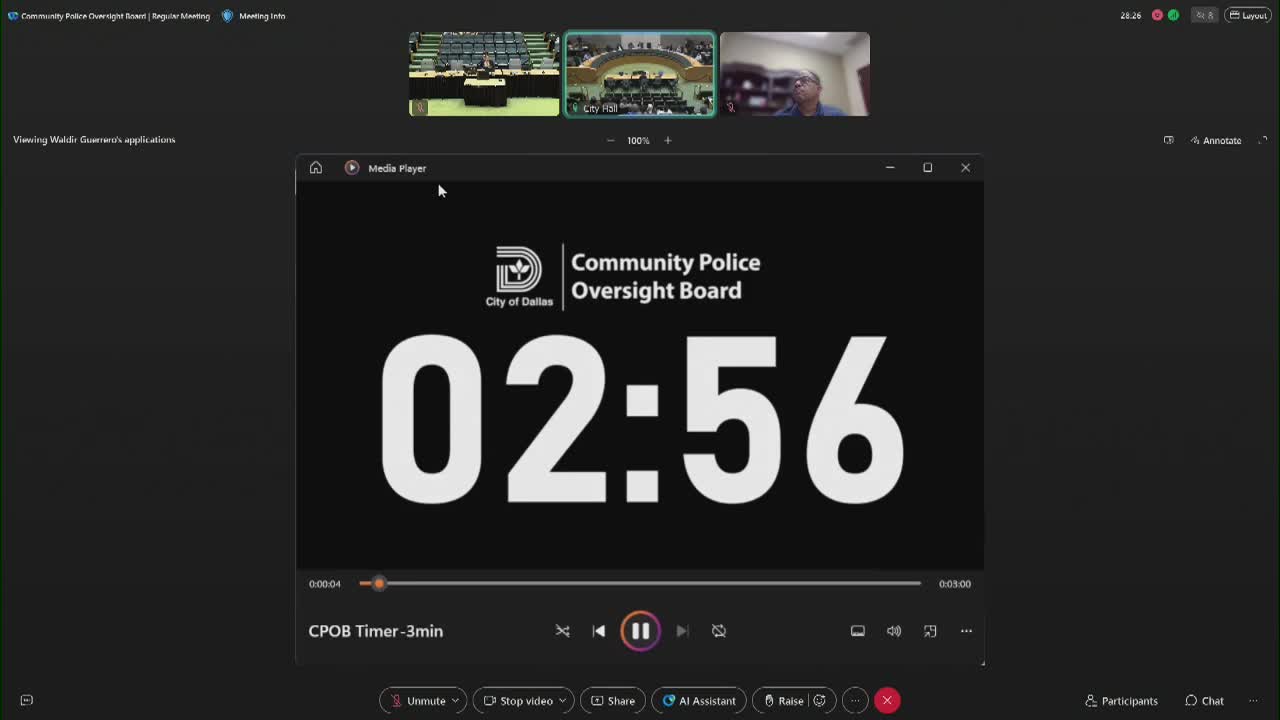Dallas oversight board hears public complaints over DPD ties to ICE, Flock cameras
Get AI-powered insights, summaries, and transcripts
Subscribe
Summary
Public commenters told the Community Police Oversight Board that Dallas Police Department data and camera systems are being used to assist Immigration and Customs Enforcement and urged the board to end any collaboration; speakers also asked the board to press DPD for transparency on camera searches and data access.
Monica Solis, a resident of District 3, urged the Community Police Oversight Board on Wednesday to end any collaboration between the Dallas Police Department and Immigration and Customs Enforcement, saying she submitted photos showing DPD and ICE together at a north Dallas police station and that the presence of immigration agents is terrorizing communities.
"I am here to demand that you end your your collaboration with ICE," Solis said, reading remarks into the public record and adding that cameras and enforcement are traumatizing neighbors who live near stations and schools.
Sam Williams, a District 9 resident who said he witnessed a late-night abduction-style arrest, told the board he believed people identifying themselves as police were conducting questionable arrests and asked DPD to document and limit contact with federal immigration authorities. "As Dallas residents, we are put at risk anytime someone who is not a police officer identifies as such," Williams said.
Azael Alvarez, citing public records he said were reviewed by 404 Media, told the board that internal searches of license-plate camera networks—sometimes labeled for immigration use—have been run from Dallas and nationwide. "DPD performed multiple searches through flock safety license plate cameras labeled ice and ERO ... Dallas officers access data from over 6,600 camera networks and 77,000 devices nationwide," Alvarez said, asking the board to demand details about what data was searched and who accessed it.
Victor Macias, who identified himself as a UNT Dallas campus resident and Army veteran, criticized a proposed police academy on campus grounds and tied his opposition to broader concerns about policing and immigration cooperation. "The continuous arguments ... to train them based on their research in hopes for a more progressive police. However, this is a complete lie," Macias said, and urged the board and the city to invest in community services rather than enforcement.
Board members thanked speakers and moved into the scheduled agenda; the public-comment block concluded before the board approved minutes and started other business.
Why this matters: Speakers described the combination of license-plate camera searches and law-enforcement encounters with federal immigration actors as a civil‑liberties and public‑safety concern for immigrant communities. The board does not set DPD policy but can request documents, conduct independent reviews of incidents, and forward recommendations to the chief.
What the board heard in detail: Multiple commenters asked for clarity on whether DPD is providing ICE with access to Flock Safety license-plate camera lookups or other surveillance data, and whether DPD officers are appearing in public wearing equipment that would lead residents to believe federal agents are acting in local uniforms. Commenters requested that the OCPO and the board press for specific logs of camera queries, formal limits on federal access, and policies that require documentation of any joint activity.
Board response and next steps: The board recorded the public comments and proceeded with its agenda. Several board members later raised the issue of how surveillance data is governed during their dialogue with the police chief and staff, and the board asked OCPO staff to follow up on outstanding access and data‑use questions.
Community detail and context: Public speakers referenced (a) public records searches and a 03/06/2025 access event they said involved “ICE” and “ERO” queries, (b) a neighborhood camera network (Flock Safety) and license-plate queries, and (c) concerns that officers or others wearing police-marked garments were conducting or assisting immigration enforcement. The record presented to the board included still photos and a cell-phone video submitted by witnesses, which the board had on file.
Ending: The board did not take formal enforcement action during the public-comment period, but the remarks set the topic for later discussion with the police chief and for follow-up requests to DPD and OCPO about camera-query logs and documented federal contacts.
